Appearance
TypeScript 类型编程的代码看起来比较复杂,但其实这些逻辑用 JS 大家都会写,之所以到了类型体操就不会了,那是因为还不熟悉一些套路。
所以,这节开始我们就来学习一些类型体操的套路,熟悉这些套路之后,各种类型体操逻辑就能够很顺畅的写出来。
首先,我们来学习类型体操的第一个套路:模式匹配做提取。
模式匹配
我们知道,字符串可以和正则做模式匹配,找到匹配的部分,提取子组,之后可以用 1,1,2 等引用匹配的子组。
js
'abc'.replace('/a(b)c/)', '$1,$1,$1')
// 得到
// 'b,b,b'Typescript 的类型也同样可以做模式匹配。
比如这样一个 Promise 类型:
typescript
type p = Promise<'guang'>我们想提取 value 的类型,可以这样做:
typescript
type GetValueType<P> = P extends Primise<infer Value> ? Value : never通过 extends 对传入的类型参数 P 做模式匹配,其中值的类型是需要提取的,通过 infer 声明一个局部变量 Value 来保存,如果匹配,就返回匹配到的 Value,否则就返回 never 代表没匹配到。

这就是 Typescript 类型的模式匹配:
📚 Typescript 类型的模式匹配是通过 extends 对类型参数做匹配,结果保存到通过 infer 声明的局部类型变量里,如果匹配就能从该局部变量里拿到提取出的类型。
这个模式匹配的套路有多有用呢?我们来看下在数组、字符串、函数、构造器等类型里的应用。
数组类型
First
数组类型想提取第一个元素的类型怎么做呢?
typescript
type arr = [1,2,3]用它来匹配一个模式类型,提取第一个元素的类型到通过 infer 声明的局部变量里返回。
typescript
type GetFirst<Arr extends unknown[]> =
Arr extends [infer First, ...unknown[]] ? First : neverTIP
any 和 unknown 的区别:
- any 和 unknown 都代表任意类型,但是 unknown 只能接收任意类型的值,而 any 除了可以接收任意类型的值,也可以赋值给任意类型(除了 never)。类型体操中经常用 unknown 接受和匹配任何类型,而很少把任何类型赋值给某个类型变量。
对 Arr 做模式匹配,把我们要提取的第一个元素的类型放到通过 infer 声明的 First 局部变量里,后面的元素可以是任何类型,用 unknown 接收,然后把局部变量 First 返回。
当类型参数 Arr 为 [1,2,3] 时:

当类型参数 Arr 为 [] 时:

Last
可以提取第一个元素,当然也可以提取最后一个元素,修改下模式类型就行:
typescript
type GetLast<Arr extends unknown[]> =
Arr extends [...unknown[], infer Last] ? Last : never;
// type GetLastResult = 3
type GetLastResult = GetLast<[1, 2, 3]>
// type GetLastResult = never
type GetLastResult = GetLast<[]>
PopArr
我们分别取了首尾元素,当然也可以取剩余的数组,比如取去掉了最后一个元素的数组:
typescript
type PopArr<Arr extends unknown[]> =
Arr extends []
? []
: Arr extends [...infer Rest, unknown]
? Rest : never
// type PopResult = [1, 2]
type PopResult = PopArr<[1, 2, 3]>
// type PopResult = []
type PopResult2 = PopArr<[]>如果是空数组,就直接返回,否则匹配剩余的元素,放到 infer 声明的局部变量 Rest 里,返回 Rest。


ShiftArr
同理可得 ShiftArr 的实现(去掉第一个元素):
typescript
type ShiftArr<Arr extends unknown[]> =
Arr extends []
? []
: Arr extends [unknown, ...infer Rest]
? Rest
: never
// type ShiftResult = [2, 3]
type ShiftResult = ShiftArr<[1, 2, 3]>
// type ShiftResult2 = []
type ShiftResult2 = ShiftArr<[]>
字符串类型
字符串类型也同样可以做模式匹配,匹配一个模式字符串,把需要提取的部分放到 infer 声明的局部变量里。
StartsWith
判断字符串是否以某个前缀开头,也是通过模式匹配:
typescript
type StartsWith<Str extends string, Prefix extends string>
= Str extends `${Prefix}${string}` ? ture : false;
// type StartsWithResult = true
type StartsWithResult = StartsWith<'guang and dong', 'guang'>
// type StartsWithResult2 = false
type StartsWithResult2 = StartsWith<'guang and dong', 'dong'>需要声明字符串 Str、匹配的前缀 Prefix 两个类型参数,它们都是 string。
用 Str 去匹配一个模式类型,模式类型的前缀是 Prefix,后面是任意的 string,如果匹配返回 true,否则返回 false。

Replace
字符串可以匹配一个模式类型,提取想要的部分,自然也可以用这些再构成一个新的类型。
比如实现字符串替换:
typescript
type Replace<
Str extends string,
From extends string,
To extends string
> = Str extends `${infer Prefix}${From}${infer Suffix}`
? `${Prefix}${To}${Suffix}`
: Str;
// 匹配上
type ReplaceResult = ReplaceStr<"Guangguang's best friend is ?", "?", "Dongdong">
// 没匹配上
type ReplaceResult2 = ReplaceStr<"abc", "?", "Dongdong">;声明要替换的字符串 Str、待替换的字符串 From、替换成的字符串 3 个类型参数,通过 extends 约束为都是 string 类型。
用 Str 去匹配模式串,模式串由 From 和之前之后的字符串构成,把之前之后的字符串放到通过 infer 声明的局部变量 Prefix、Suffix 里。
用 Prefix、Suffix 加上替换到的字符串 To 构造成新的字符串类型返回。
当匹配时:

没匹配上,返回原字符串:

Trim
能够匹配和替换字符串,那也就能实现去掉空白字符的 Trim:
不过因为我们不知道有多少个空白字符,所以只能一个个匹配和去掉,需要递归。
先实现 TrimRight:
typescript
type TrimStrRight<Str extends string> =
Str extends `${infer Rest}${' ' | '\n' | '\t'}`
? TrimStrRight<Rest>
: Str;
// type TrimRightResult = 'guang'
type TrimRightResult = TrimStrRight<'guang '>类型参数 Str 是要 Trim 的字符串。
如果 Str 匹配字符串 + 空白字符 (空格、换行、制表符),那就把字符串放到 infer 声明的局部变量 Rest 里。
把 Rest 作为类型参数递归 TrimRight,直到不匹配,这时的类型参数 Str 就是处理结果。

同理可得 TrimLeft:
typescript
type TrimStrLeft<Str extends string> =
Str extends `${' ' | '\n' | '\t'}${infer Rest}`
? TrimStrLeft<Rest>
: Str;
// type TrimRightResult = 'guang'
type TrimLeftResult = TrimStrLeft<' guang'>
TrimRight 和 TrimLeft 结合就是 Trim:🎉
typescript
type TrimStr<Str extends string> =TrimStrRight<TrimStrLeft<Str>>
函数
函数同样也可以做类型匹配,比如提取参数、返回值的类型。
GetParameters
函数类型可以通过模式匹配来提取参数的类型:
typescript
type GetParameters<Func extends Function> =
Func extends (...args: infer Args) => unknown ? Args : never;
// 返回一个元祖类型
// type ParametersResult = [name: string, age: number]
type ParametersResult = GetParameters<(name: string, age: number) => string>;类型参数 Func 是要匹配的函数类型,通过 extends 约束为 Function。
Func 和模式类型做匹配,参数类型放到用 infer 声明的局部变量 Args 里,返回值可以是任何类型,用 unknown。
返回提取到的参数类型 Args。

TIP
TS3.1 添加了 Paramters<Type> 类似功能。
GetReturnType
能提取参数类型,同样也可以提取返回值类型:
typescript
type GetReturnType<Func extends Function> =
// 这里参数用的是any
Func extends (...args: any[]) => infer R ? R : never
// type Result = 'dong'
type Result = GetReturnType<() => 'dong'>Func 和模式类型做匹配,提取返回值到通过 infer 声明的局部变量 ReturnType 里返回。
参数类型可以是任意类型,也就是 any[](🚨注意,这里不能用 unknown,这里的解释涉及到参数的逆变性质,具体原因逆变那一节会解释)。

TIP
TS工具类型 ReturnType<Type>
GetThisParameterType
方法里可以调用 this,比如这样:
js
class Dong {
name: string;
constructor() {
this.name = "dong";
}
hello() {
return 'hello, I\'m ' + this.name;
}
}
const dong = new Dong();
dong.hello();用对象.方法名的方式调用的时候,this 就指向那个对象。
但是方法也可以用 call 或者 apply 调用:
typescript
class Dong {
name: string;
constructor() {
this.name = "dong";
}
hello() {
return 'hello, I\'m ' + this.name;
}
}
const dong = new Dong();
dong.hello();
dong.hello.call({xxx: 1}) call 调用的时候,this 就变了,但这里却没有被检查出来 this 指向的错误。
如何让编译器能够检查出 this 指向的错误呢?
可以在方法声明时指定 this 的类型:
typescript
class Dong {
name: string
constructor(name: string) {
this.name = name
}
hello() {
hello(this: Dong) {
return 'Hello, I\'m ' + this.name
}
}
const dong = new Dong('dong')
dong.hello()
dong.hello.call({xxx: 1}) 这样,当 call/apply 调用的时候,就能检查出 this 指向的对象是否是对的:
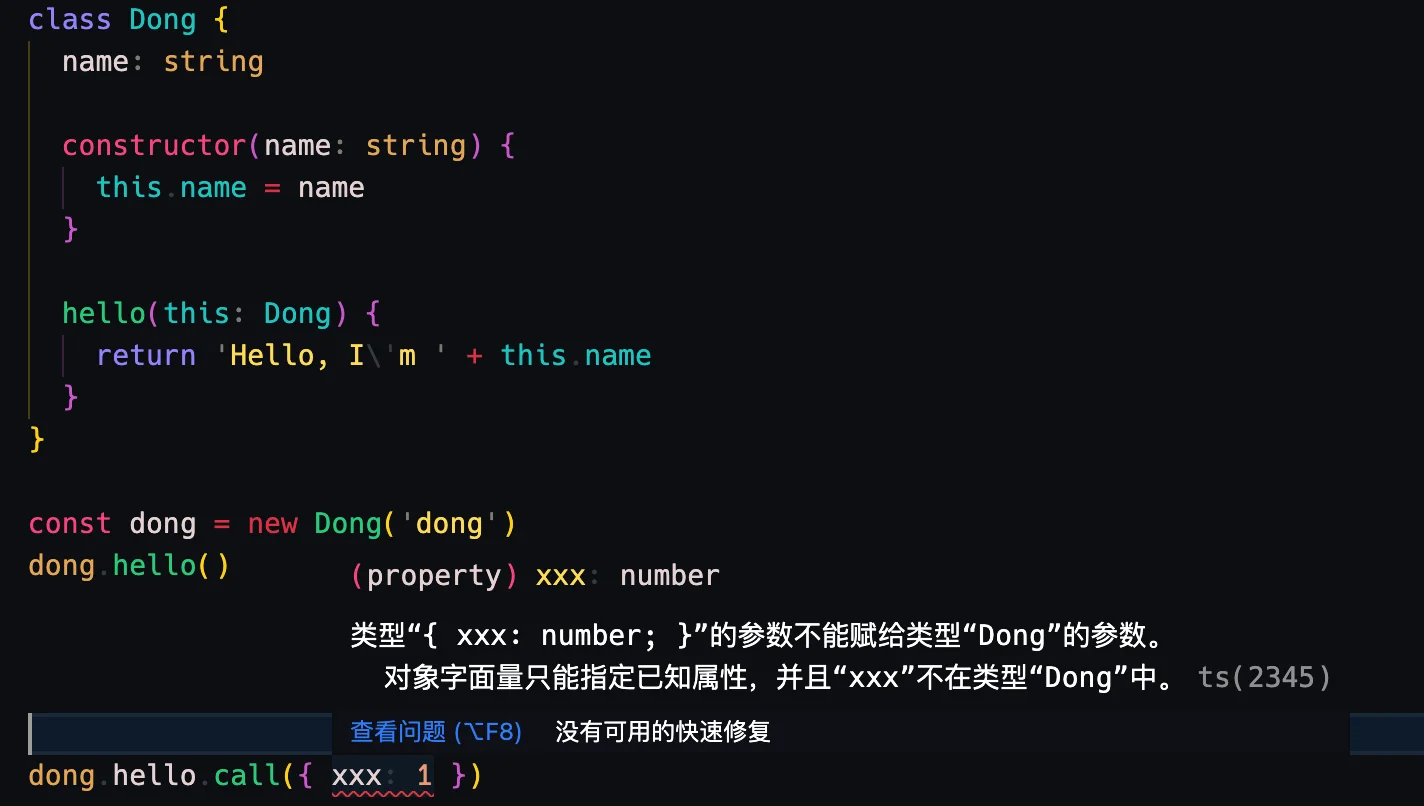
如果没有报错,说明没开启 strictBindCallApply 的编译选项,这个是控制是否按照原函数的类型来检查 bind、call、apply

这里的 this 类型同样也可以通过模式匹配提取出来:
typescript
type GetThisParameterType<T>
= T extends (this: infer ThisType, ...args: any[]) => any
? ThisType
: unknown;类型参数 T 是待处理的类型。
用 T 匹配一个模式类型,提取 this 的类型到 infer 声明的局部变量 ThisType 中,其余的参数是任意类型,也就是 any,返回值也是任意类型。
返回提取到的 ThisType。
这样就能提取出 this 的类型:
typescript
type GetThisParameterTypeRes = GetThisParameterType<typeof dong.hello>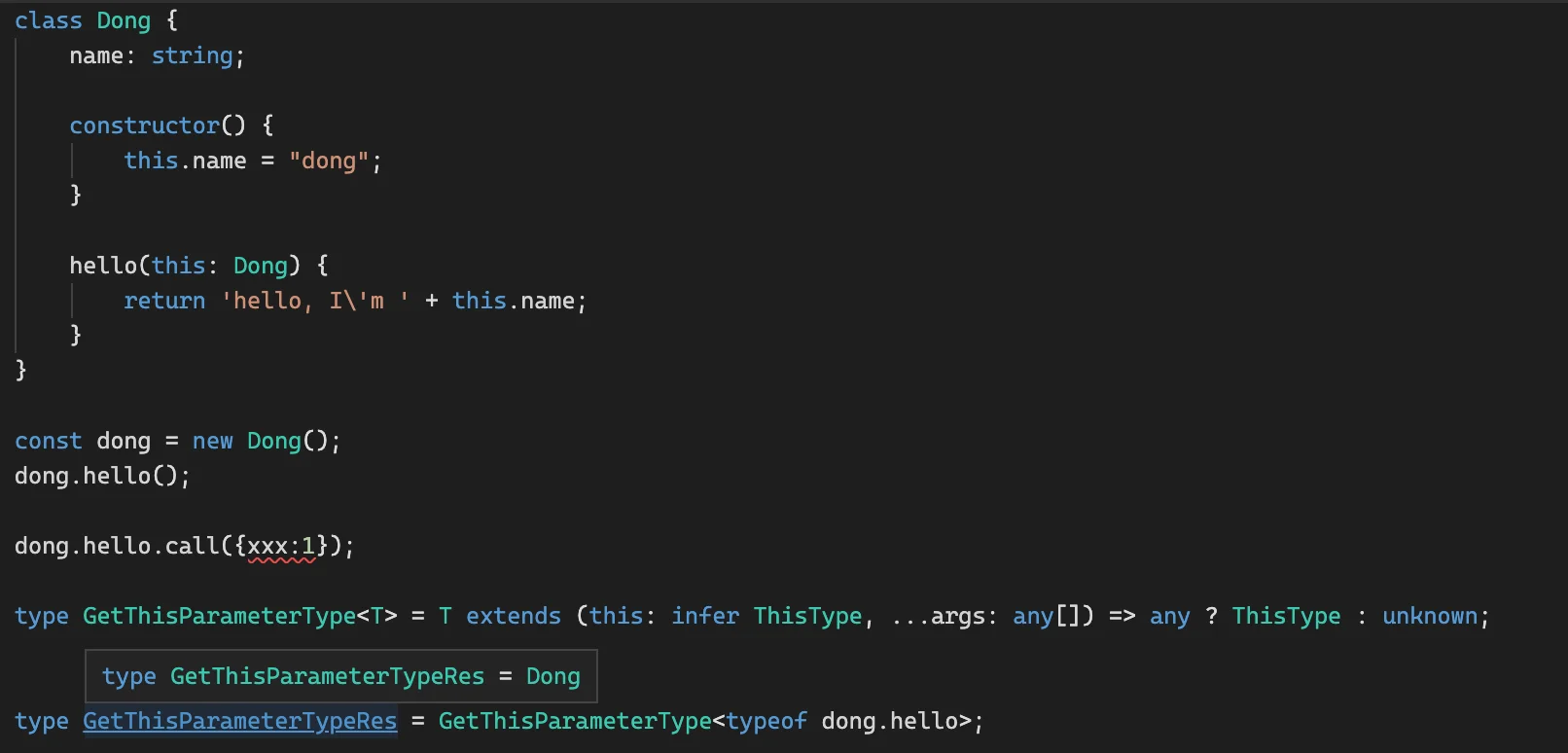
TIP
TS中存在 ThisParameterType<Type> 工具类型
构造器
构造器和函数的区别是,构造器是用于创建对象的,所以可以被 new。
同样,我们也可以通过模式匹配提取构造器的参数和返回值的类型:
GetInstanceType
构造器类型可以用 interface 声明,使用 new(): xx 的语法。比如:
typescript
interface Person {
name: string;
}
interface PersonConstructor {
new(name: string): Person
}这里的 PersonConstructor 返回的是 Person 类型的实例对象,这个也可以通过模式匹配取出来。
typescript
type GetInstanceType<
Ctor extends new (...args: any[]) => any
> = Ctor extends new (...args: any[]) => infer InstanceType
? InstanceType
: any
type GetInstanceTypeRes = GetInstanceType<PersonConstructor>类型参数 ConstructorType 是待处理的类型,通过 extends 约束为构造器类型。
用 ConstructorType 匹配一个模式类型,提取返回的实例类型到 infer 声明的局部变量 InstanceType 里,返回 InstanceType。
这样就能取出构造器对应的实例类型:
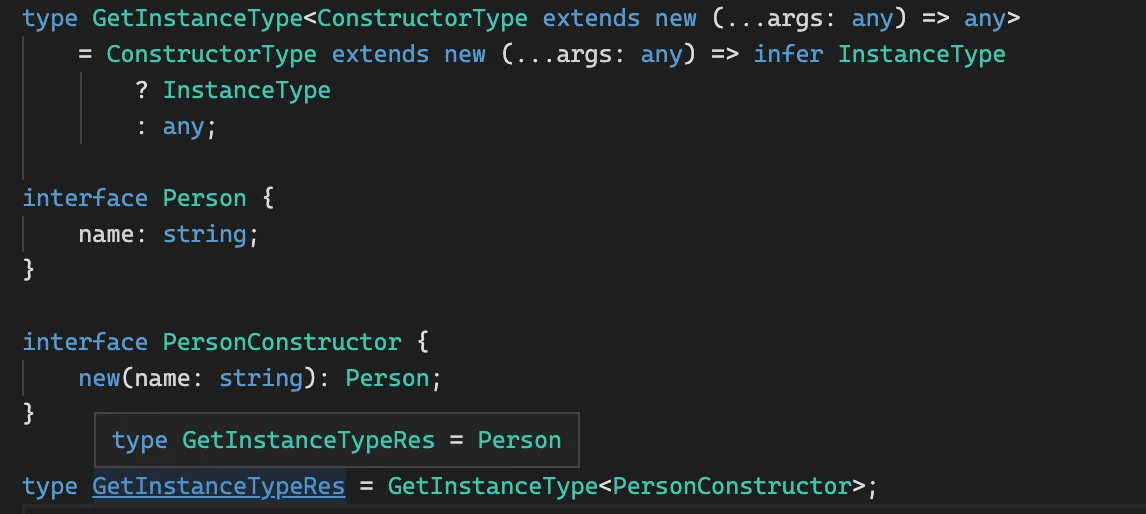
TIP
TS存在 InstanceType<Type> 工具类型
GetConstructorParameters
GetInstanceType 是提取构造器返回值类型,那同样也可以提取构造器的参数类型:
typescript
type GetConstructorParameters<
Ctor extends new (...args: any[]) => any
> = Ctor extends new (...args: infer ParametersType) => any
? ParametersType
: any
interface Person {
name: string;
}
interface PersonCtor {
new (name: string): Person
}
// 返回一个元祖
// type Result = [name: string]
type Result = GetConstructorParameters<PersonCtor>类型参数 ConstructorType 为待处理的类型,通过 extends 约束为构造器类型。
用 ConstructorType 匹配一个模式类型,提取参数的部分到 infer 声明的局部变量 ParametersType 里,返回 ParametersType。
这样就能提取出构造器对应的参数类型:
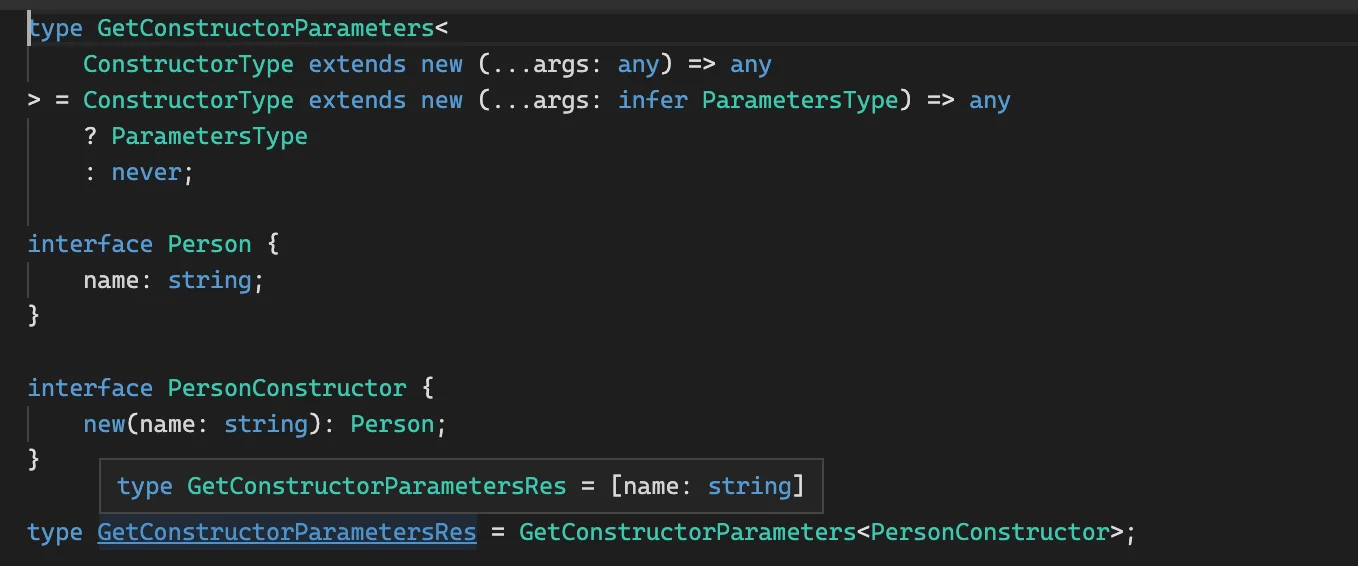
TIP
TS存在 ConstructorParameters<Type> 工具类型。
索引类型
索引类型也同样可以用模式匹配提取某个索引的值的类型,这个用的也挺多的,比如 React 的 index.d.ts 里的 PropsWithRef 的高级类型,就是通过模式匹配提取了 ref 的值的类型:

我们简化一下那个高级类型,提取 Props 里 ref 的类型:
GetRefProps
我们同样通过模式匹配的方式提取 ref 的值的类型:
typescript
type GetRefProps<Props> =
'ref' extends keyof Props // Props中是否存在 'ref' 属性
? Props extends { ref?: infer Value | undefined } // 对ref的值进行推断
? Value
: never
: never类型参数 Props 为待处理的类型。
通过 keyof Props 取出 Props 的所有索引构成的联合类型,判断下 ref 是否在其中,也就是 'ref' extends keyof Props。
为什么要做这个判断,上面注释里写了:
js
// need to check first if `ref` is a valid prop for ts@3.0
// otherwise it will infer `{}` instead of `never`在 ts3.0 里面如果没有对应的索引,Obj[Key] 返回的是 {} 而不是 never,所以这样做下兼容处理。
如果有 ref 这个索引的话,就通过 infer 提取 Value 的类型返回,否则返回 never。
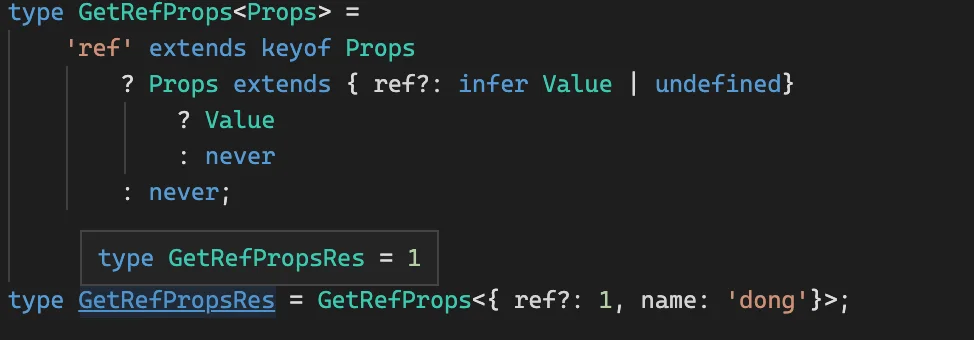
当 ref 为 undefined 时:
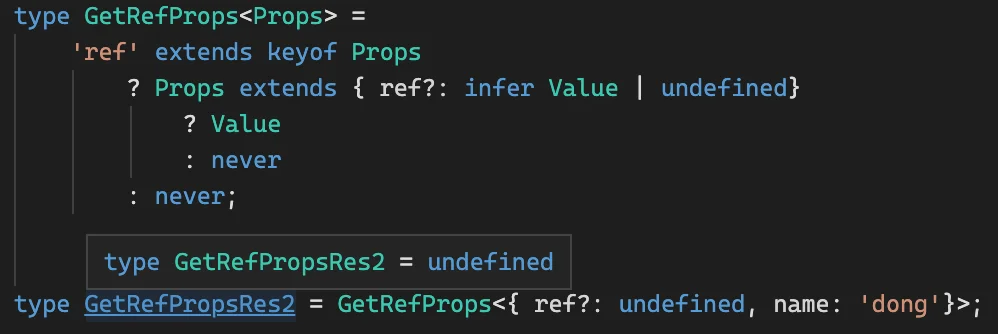
总结
就像字符串可以匹配一个模式串提取子组一样,TypeScript 类型也可以匹配一个模式类型提取某个部分的类型。
TypeScript 类型的模式匹配是通过类型 extends 一个模式类型,把需要提取的部分放到通过 infer 声明的局部变量里,后面可以从这个局部变量拿到类型做各种后续处理。 🎉
模式匹配的套路在数组、字符串、函数、构造器、索引类型、Promise 等类型中都有大量的应用,掌握好这个套路能提升很大一截类型体操水平。
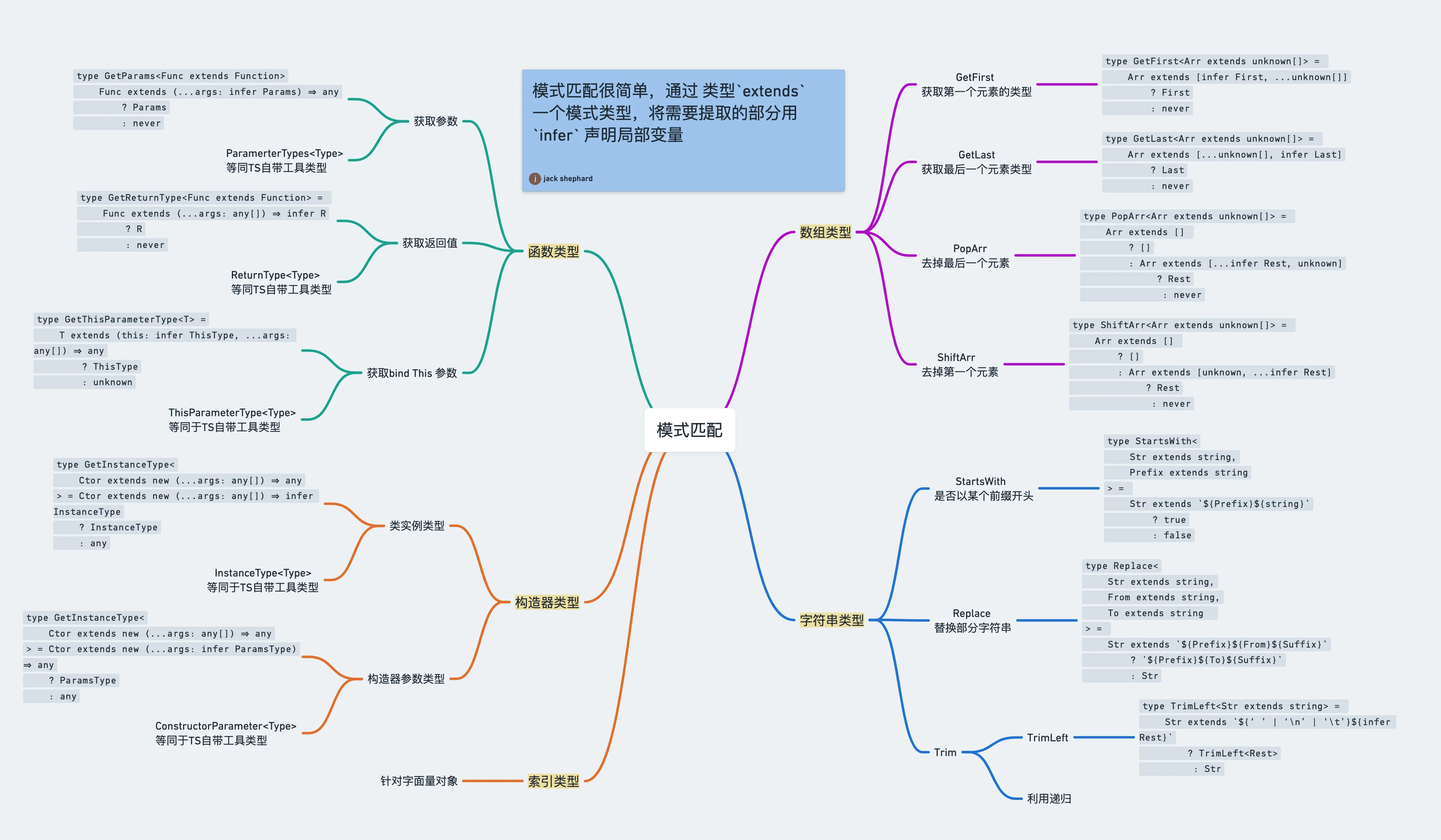
2023年03月07日15:42:29